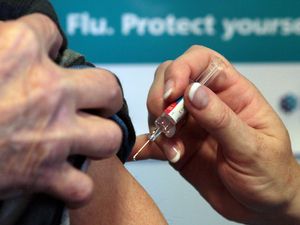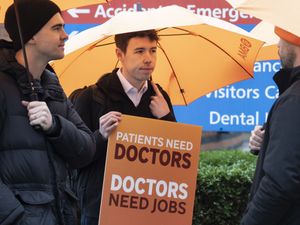New Cross Hospital whistleblower: 'Now I've finally been heard I want my reputation back'
'I was hopeful that someone would hear me. And they have.'
The words of whistleblower Sandra Haynes-Kirkbright who today spoke after an independent inquiry found her employers at New Cross Hospital had failed to act properly when she raised concerns over the recording of death rates.
The damning inquiry found the hospital's handling of Mrs Haynes-Kirkbright's concerns, which also accused the trust of claiming too much money for patients' care, was 'significantly flawed' and she was 'not treated fairly'.
And it said her boss Royal Wolverhampton Hospitals NHS Trust chief executive David Loughton told two directors to 'ensure' Mrs Haynes-Kirkbright's concerns 'did not interfere' with an inspection by health watchdog Monitor.
Later colleagues accused her of bullying behaviour and she was suspended.
MORE: Revealed - New Cross Hospital treated whistleblower 'unfairly'
MORE: How coding boss was signed off sick and then suspended
MORE: The Royal Wolverhampton NHS trust statement in full
Yesterday's published report into the hospital trust was carried out by independent body Verita. Now the NHS has commissioned a governance review to deal with failings found over the review.
Today, Mrs Haynes-Kirkbright, who lives in Stafford, said: "I believe the report speaks for itself, I would now, going forward, like very much that the issues which I blew the whistle about are fully investigated rather than it be about whether I have a job or not.
"It wasn't about me, it was about the data. That's why you do it, not for fun and games. The other thing I want is to have my reputation back. At one point I think I had a rather good reputation as a coding manager, I was suspended for four years and I don't think my reputation has survived it."
It all started in 2011 when Mrs Haynes-Kirkbright was headhunted to work for the trust. Her job, with a salary of £54,454, was to review the accuracy of coding for palliative care in the case of patients who had died in hospital.
If an inpatient receives care from the palliative care team and then dies, the coding ensures the hospital's standardised mortality rate takes this into account as death is unavoidable. If coding is not used, the mortality rate will be higher than it should be, suggesting the hospital is not as safe as it actually is. However, into her job, she claimed to have found inaccuracies in the coding of patients.
One example, she alleged, was a patient coded as having received specialist palliative care, while in fact they had palliative radiotherapy, which does not come within the coding category for specialist palliative care.
Another issue she claimed was over coding of patients admitted. She alleged every single child that went through a paediatric unit and stayed overnight was coded with a intracanial head injury, providing the hospital close to £2,000 for each case.
Then in April 2012, with Mr Loughton aware of her concerns, he failed to initiate a whistleblowing investigation. Instead, the report found 'he instructed two of his executive directors to ensure that Mrs Haynes-Kirkbright's concerns did not interfere with the Monitor visit.'
The handling of a meeting with Mrs Haynes-Kirkbright by director of finance Kevin Stringer was also criticised by the report, which said 'he (Mr Stringer) was acting under a clear imperative from the chief executive to ensure Mrs Haynes-Kirkbright did not embarrass the trust while Monitor staff were on site.'
The report said: "The trust did not follow due process with regard to its policies and procedures in its initial handling of the coders' collective complaint."
Following the report's publication yesterday, Wolverhampton South East MP Pat McFadden, said: "I sincerely hope that the trust learns a lesson from this episode and makes the necessary changes for the future. It is important that these very serious criticisms are reacted to in the right way.
"This is not the first time the treatment of whistleblowers has been called into question.
"It is vital that whistleblowers know they have the freedom to speak out when they feel that things are going wrong or not being done properly.
"We must protect the capacity for people in public service to come forward."
Councillor Milkinder Jaspal, chair of Wolverhampton council's health and scrutiny panel, said: "The report is alarming. The fact is that the treatment of this whistleblower was wrong in a number of respects.
"It makes you wonder if the trust has really taken on board the findings of the Francis Report. They say they take whistleblowing seriously and that they have reviewed their policies and procedures, but this situation should never have happened in the first place.
"A situation where a whistleblower gets penalised for coming forward with matters of concern is just not acceptable."




